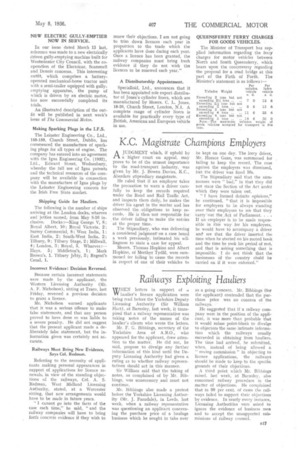Railways Exploiting Hauliers
Page 31

If you've noticed an error in this article please click here to report it so we can fix it.
WHEN letters in support of VI/ haulier's licence application were being read before the Yorkshire Deputy Licensing Authority (Sir William Hart), at Barnsley, last week, it transpired that a railway representative was taking notes of the names of the haulier's clients who wrote the letters.
Mr. F. G. Bibbings, secretary of the Yorkshire Area of A.R.O., who appeared for the applicant, drew attention to the matter. He did not, he said, propose to divulge any further information of this kind until the Deputy Licensing Authority had given a ruling as to whether railway representatives should act in this manner.
Sir William said that the taking of notes, as complained of by Mr. Bibbings, was unnecessary and must not continue.
Mr. Bibbings also made a protest before the Yorkshire Licensing Authority (Mr. J. Farndale), in Leeds, last week, when a railway representative was questioning an applicant concerning the purchase price of a haulage business which he sought to take over as a going concern, Mr. Bibbings (for the applicant) contended that the purchase price was no concern of the railways.
He suggested that if a railway company were in the position of the applicant, it was more than probable that it would refuse point-blank to divulge to objectors the same intimate information which the railways usually succeeded in obtaining from hauliers. The time had arrived, he submitted, when, instead of being allowed a " roving commission" in objecting to licence applications, the railways should be made to keep to the specific grounds of their objections.
A third point which Mr. Bibbings raised, last week, at Barnsley, also concerned railway procedure in the matter of objections. He complained that in 99 per cent. of cases the railways failed to support their objections by evidence. In nearly every instance, Licensing Authorities were asked to ignore the evidence of business men and to accept the unsupported submissions of railway counsel.




























































































